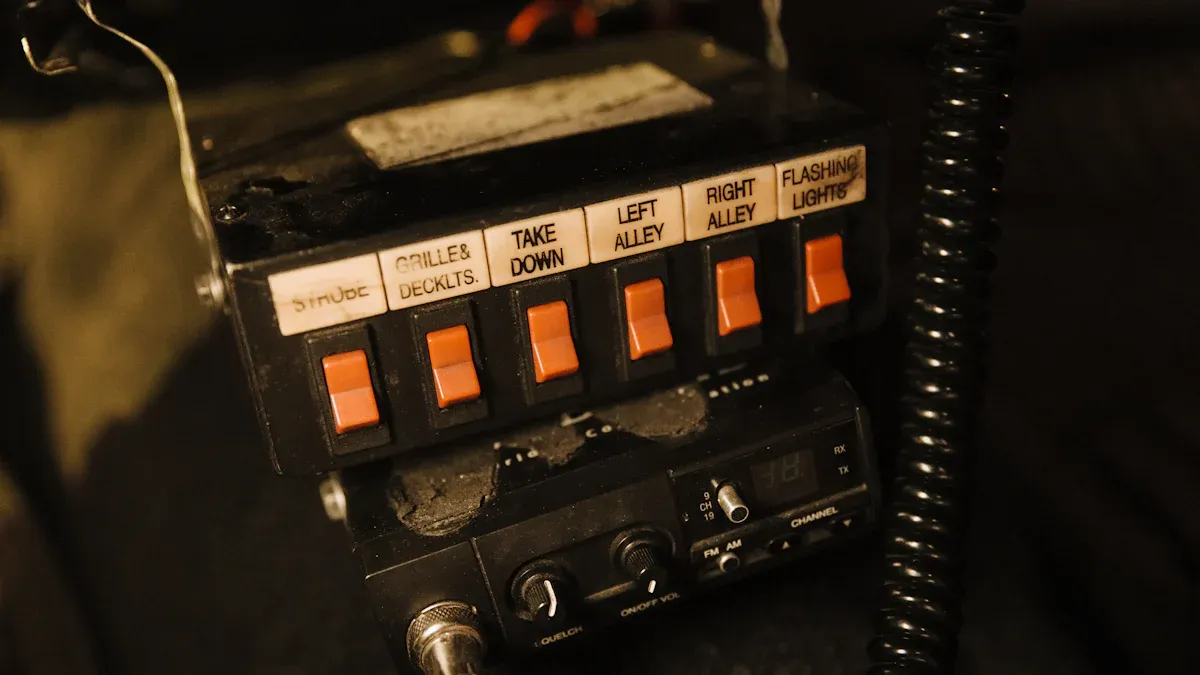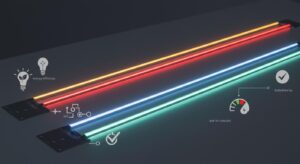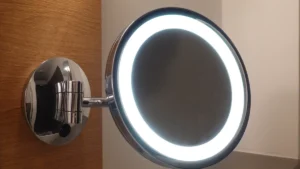
Choosing the right flasher module for LED lights is very important. This is true for your car’s turn signals or home lights. The right module can change everything. You have many options like the LM486, CF13, and EP26. You should think about what you want. Look for a module that matches your style. It should work well and meet your needs. Knowing what you like will help you pick the best one.
Key Takeaways
Picking the right flasher module is very important for LED lights. It helps them work well and stops problems like hyperflashing.
Think about the type of flasher module you need. There are options like electronic, thermal, load resistor, and OBD2 modules. Each one has its own benefits.
Make sure it is compatible with your vehicle and LED lights. Not all modules work with every setup. Check the specifications to avoid issues.
Look for features like adjustable speed and easy installation. These can improve visibility and make setup easier.
Check out recommendations based on how you will use it. Different modules are better for motorcycles, cars, and home lighting, so choose carefully.
What is a Flasher Module?
A flasher module is an important electronic part for cars with LED lights. It helps manage the low power use of light-emitting diodes. When you switch to LED turn signals, you may see problems like hyperflashing or no flashing at all. This happens because LED lights use less energy than regular bulbs. The flasher module fixes these issues by controlling how fast your turn signals blink based on the circuit’s power load.
Here’s how it works:
The flasher module controls the flash speed of different vehicle lights, like indicators, fog lights, and deck lights.
It works in a solid-state way, meaning it has no moving parts and is more dependable than older types.
By changing the timing of the electrical signals sent to the lights, the module makes sure your LED lights blink at the right times.
You can also find different kinds of flasher modules with various features. For example, some LED flasher modules let you pick from different flash patterns. This can help you be more visible, especially for emergency vehicles or during special occasions.
For instance, the LED Warning Flasher Module has 24 flash/strobe modes, including wig-wag patterns. This module works with your current wiring, making it easy to add to your system. If you want more choices, the Auto Flasher module has 29 possible flash patterns, letting you customize your lights even more.
Types of Flasher Modules for LED Lights

When you pick a flasher module for LED lights, you have many choices. Each type has its own job and can make your lights better. Let’s look at the different types of flasher modules you can find.
Electronic Flasher Modules
Electronic flasher modules are popular because they are reliable and work well. They use solid-state technology, which means they have no moving parts. This makes them less likely to break than mechanical flashers. You will see that electronic flashers can handle the low power of LED lights without causing problems like hyperflashing.
Benefits:
Fast response time
Adjustable flash rates
Works with many LED setups
Thermal Flasher Modules
Thermal flasher modules work in a different way. They depend on heat to work, so they can be less efficient with LED lights. When you switch to LEDs, these modules might not work right because they expect more power. If you use regular bulbs, thermal flashers can be good, but for LED lights, you should think about other options.
Drawbacks:
Slower response time
May not work well with low-power LEDs
Load Resistor Flasher Modules
Load resistor flasher modules are another choice. They add resistance to the circuit, acting like traditional bulbs. This helps stop hyperflashing when you use LED lights. But remember, these modules can get hot, which might not be good for all setups.
Key Features:
Easy to install
Affordable way to stop hyperflashing
OBD2 Light Flasher Modules
If you want something more advanced, OBD2 light flasher modules could be right for you. These modules connect with your vehicle’s onboard diagnostics system. They can offer extra features like strobe effects and different flash patterns. For example, the Auto Flasher Module (WAF) lets you pick from 29 flash patterns, making it a flexible choice for many uses.
Advantages:
Easy to connect with factory lighting
Better visibility with strobe effects
Headlight Strobe Lights
Headlight strobe lights are a special kind of flasher module. They are often used for emergency vehicles or for people who want unique lighting. These modules can create eye-catching strobe patterns, making your vehicle stand out. If you want this option, make sure it follows local laws.
Considerations:
Check local laws about strobe lights
Make sure it works with your vehicle’s electrical system
Turn Signal Flasher Options
When you need turn signal flashers, there are some great choices. Two popular ones are the 3-Pin Electronic LED Flasher Relay and Ultra-Slim Micro Units. Let’s look at what makes each one special.
3-Pin Electronic LED Flasher Relay
The 3-pin electronic LED flasher relay is a big help for your turn signals. Unlike old relays made for regular bulbs, this relay works with the lower power of LED lights. This means you won’t see hyperblinking, where your turn signals flash too fast. Instead, you’ll have a steady and reliable blink rate.
This relay is easy to set up and works well with both LED and regular lights. You can just swap it with your old relay, and you’re ready! Plus, it can handle up to 10 amps per output, making it a strong choice for many uses.
Ultra-Slim Micro Units
If you want something small, the ultra-slim micro units are just right. These tiny devices are very light and fit into small spaces, making them great for custom bikes or cars with little room.
Here’s a quick look at the benefits of ultra-slim micro units:
Feature/Benefit | Description |
|---|---|
Ultra-compact and light | Just a piece of cable attached to a tiny, candy-sized device |
Ideal for custom bikes | Fits in limited mounting spaces, eliminating the need for bulky relays |
Wiring flexibility | Can be placed into handlebar or frame tubes or into the wiring harness |
Load independence | Operates with a minimum of 1 Watt, making it versatile for various lights |
Digital technology | Microprocessor-controlled with no mechanical parts, ensuring reliability |
Consistent flasher frequency | Works with almost all LED and halogen turn signal lights |
Brighter illumination | Provides immediate, loss-free, and brighter lighting for turn signals |
Easy connection | Requires only two cables for installation |
Durability | Completely watertight and vibration resistant due to molded construction |
Safety features | Short circuit proof and has automatic overload protection, handling up to 100 W |
Low heat generation | Operates without generating heat, enhancing safety |
Voltage compatibility | Works with 5 – 18 V and is also applicable for 6 V turn signal lights |
Quality assurance | Made in Germany by Motogadget |
With these choices, you can improve your turn signal performance and make sure your lights work well. Whether you pick the 3-pin electronic relay or the ultra-slim micro unit, both options give great functionality for your LED lights.
Compatibility with LED Lights

When you pick a flasher module for LED lights, compatibility is key. Not every module works with all vehicles or LED setups. Let’s look at what you need to know.
Vehicle Compatibility
The make and model of your vehicle can change which flasher module is best. Some modules, like Z-Flash, fit many vehicles, including GM, Dodge/Jeep/Ram, and Ford. This wide range makes it easier to find the right module. However, Speed Turtle’s EFM modules only support Chrysler, GM, and Ford vehicles, so they are more limited.
Here are some common problems you might see:
Motorcycle models may have issues if the turn signals are not made for them.
Blinking problems can happen, where LED lights flash too fast or too slow because of electrical load differences.
LED Light Compatibility
You also need to check if your LED bulbs work with the flasher module. Here’s a helpful table of important specifications to think about:
Specification | Description |
|---|---|
Compatible Conductor Size (INH) | Size of the wire that works with the module |
Bulb Wattage (W) | Power use of the bulb in watts |
Number of Diodes/Bulbs | Total number of diodes or bulbs in the light |
DB Level Max (DB) | Loudest sound level of the light |
Strobe Frequency Max (FPM) | Highest strobe speed in flashes per minute |
Strobe Frequency Min (FPM) | Lowest strobe speed in flashes per minute |
Included Light Functions | Functions that the light can do |
Selectable Flash Patterns (Yes/No) | If the light has different flash patterns |
Lamp Connection (Simplified) | Type of lamp connection used |
Power Type | Type of power needed |
Wire Type | Type of wire used for connections |
Housing Material | Material used for the light’s outer part |
Gasket Type | Type of seal used for protection |
Length | Length of the light module |
Number of Terminal Connections | Count of terminal connections available |
Number of Conductors | Total number of wires in the module |
Number of Plugs | Count of plugs available |
Number of Cables per Fitting | Number of cables that can fit per connection |
DB Level Min (DB) | Quietest sound level of the light |
Case Volume (OZA) | Size of the case in ounces |
By checking these details, you can make sure your LED lights and flasher module will work well together. This way, you’ll avoid any annoying compatibility problems later on.
Features to Consider
When you pick a flasher module for your LED lights, some features can really help. Let’s look at the important things you should think about.
Adjustable Speed
One great feature is adjustable speed. This lets you change how fast your turn signals flash. Here’s why this is important:
You can make your signals easier to see for other drivers.
It helps you follow local rules about how bright turn signals should be.
You can fix hyperflash problems by changing the flash rate to normal.
With adjustable speed, you control how your lights work, making sure they fit your needs.
Ease of Installation
You want a flasher module that’s simple to install. Look for ones that don’t need a lot of changes to your vehicle. Many new modules have plug-and-play designs, making it easy to set up. Here are some benefits of easy installation:
You save time and get your lights working quickly.
You lower the chance of hurting your vehicle’s wiring while installing.
You can usually do it yourself without needing help from a pro.
HI/LOW Output Options
Another feature to think about is HI/LOW output options. This lets you switch between different brightness levels for your LED bulbs. Here’s why this is helpful:
You can use lower brightness for regular driving, saving energy and making your bulbs last longer.
When you need to be seen better, you can switch to high output, making your signals stand out more.
Here’s a quick look at some features you might find in different flasher modules:
Feature Description | Details |
|---|---|
Flash Patterns | 29 |
Module Type | Positive Switched |
Custom Applications | Available in various types |
Steady Burn Feature | Overrides flashing, useful for reverse lights |
Self-Contained | Does not affect factory lights when inactive |
Waterproof | Fully waterproof design |
Synchronization | Can synchronize up to 8 modules |
Warranty | 2-year warranty provided |
By thinking about these features, you can choose a flasher module that fits your needs well. Whether you’re upgrading your turn signals or improving your home lighting, the right module can really help.
Recommendations for Different Use Cases
When you need to pick a flasher module, think about what you need. Here are some suggestions based on different uses.
Best for Motorcycles
Motorcycles need special flasher modules for safety and visibility. Here are some top choices based on what users say:
Model | User Feedback |
|---|---|
Vololight | Mixed reviews: Some users like it, while others have problems with how it works. |
Brake Free | Mostly good feedback for its sensitivity and not needing bike wiring. |
P3 Lights | One user is very happy with this product, saying it works well for them. |
If you ride a motorcycle, think about the Brake Free module. It connects to your bike’s brake light and improves visibility without tricky wiring.
Best for Cars
For cars, you want a module that fits well and is easy to install. Here are two highly recommended flasher modules:
Feature | SmartTap CF18 LED Flasher Module |
|---|---|
Compatibility | Works with LED or regular bulbs, no hyperflash. |
Installation | Easy plug-and-play swap for the old module. |
Unique Features | Programmable functions, tap-to-signal, special hazard functions. |
Warranty | 3-year warranty. |
Feature | Ultrabrightlightz’s Flasher Modules |
|---|---|
Compatibility | Works with many vehicle lighting setups. |
Programmability | Over 10 customizable flash patterns available. |
Durability | Strong and weather-resistant design. |
Warranty | 5-year warranty. |
The SmartTap CF18 is a great pick for its easy setup and programmable features. If you want something more customizable, the Ultrabrightlightz module has many flash patterns to match your style.
Best for Home Lighting
For home lighting, you want a flasher module that sets the mood without being too bright. Look for modules that let you change speeds and have different flash patterns. Here are some options:
LED Dimmer Modules: These let you control how bright your LED bulbs are, perfect for creating the right atmosphere.
Smart Home Compatible Modules: If you have a smart home, choose modules that work with your system for easy control.
Using the right flasher module can change how your home lighting feels. Whether you want a soft light for relaxing or bright lights for working, the right module makes a big difference.
Choosing the right flasher module for LED lights is very important. It helps your lights work well and safely. A good module makes your lights easier to see and more reliable. It also stops problems like hyperflashing. Here’s a quick look at the good things about using the right module and the bad things about using the wrong one:
Benefits of Correct Flasher Module | Drawbacks of Incompatible Module |
|---|---|
Makes sure lights work properly | Can cause problems |
Offers reliability | Might lead to hyperflashing |
Works with both LED and regular bulbs | May stop working completely |
Increases safety and visibility | Can be unsafe |
Remember, you need a module that meets your needs. Whether you are upgrading your car or improving your home lights, take time to find the best flasher module for LED lights that fits your style and needs.
FAQ
What is hyperflashing, and how can I fix it?
Hyperflashing happens when LED turn signals blink too fast. You can fix this by using a flasher module made for LEDs, like an electronic flasher relay or a load resistor module.
Can I use a flasher module with regular bulbs?
Yes, many flasher modules work with both LED and regular bulbs. Just pick a module that says it works with both types to avoid problems.
How do I install a flasher module?
Installing a flasher module is usually easy. Most modules have a plug-and-play design. Just replace your old module with the new one, following the instructions from the maker.
Are there flasher modules for motorcycles?
Yes! Many flasher modules are made just for motorcycles. Look for options that improve visibility and fit your bike’s wiring without tricky installations.
Do I need to worry about local laws for strobe lights?
Yes, you should check local laws about strobe lights. Some places have rules about using them, especially for non-emergency vehicles. Always make sure to follow the rules to avoid fines.
See Also
Selecting The Perfect LED Light Module For Your Needs
The Advantages Of Using LED Modules For Signage
Key Tips For Picking The Ideal LED Sign Module



